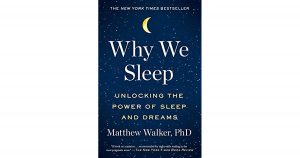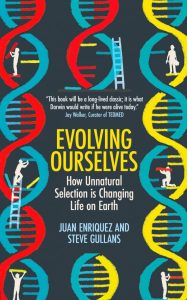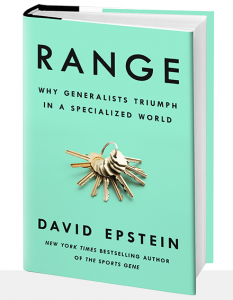Christmas time is here and hence hopefully after a lot of family dining, conversations (maybe some occasional singing) and gifting it’s also time to sit down on the couch and read a few books.
If you are struggling to find some good reading – here are the 3 books that created a lasting impression on me this year.
- Matthew Walker: Why We Sleep
- What is this book about?
- A very compelling case on the importance of sleep on quality of life and how to do it right.
- The book shows as first of its kinds the consequences of a chronic lack of sleep (which starts already from less than 8 hours per day)…

- An increase in likelihood of severe diseases such as Alzheimer, cancer, weight gain, inflammation etc.
- A negative impact on cognitive and physical performance
- … as well as the functions of each of the sleeping phases on our unique capabilities as humans
- Key Take-Aways for me personally:
- I have improved my sleeping patterns significantly – in particular due to
- Tracking sleep quality with a wristwatch (Fitbit in my case but there are plenty of other good options like an Oura-ring or a Garmin watch)
- Avoiding (as good as possible) sleep-killers such as
- Alcohol & Coffee in the late afternoons (this book makes a good case for day-drinking instead :)). Nicotine is also very bad, but fortunately this is one of the few negative habits I left out.
- Throwing out devices that emit blue-light in the sleeping room (laptops, TVs, mobile phones)
- Cooling down the temperature in the bedroom to 18-19°C and keeping it dark at night works wonders for better sleep cycles
- Trying to go to sleep at the same time every day (this one is the hardest!)
- Plus plenty of surprising anecdotes:
- Why adolescents are late-sleepers and the school hours tend to be unfair
- Why Roger Federer became so successful after starting to sleep 12 hours a day
- How the traffic accidents significantly increase the day after the switch to daylight saving time
- I have improved my sleeping patterns significantly – in particular due to
- This has been especially eye-opening as historically all-nighters, a work-hard-play-hard attitude and 80+-hour-weeks have been perceived as quite normal in the environments I have been working in (start-ups but even more so in consulting and banking)
- All-in-all a must-read for literally everyone.
2. Juan Enriquez & Steve Gullans: Evolving Ourselves
- What is this book about?

- Today humans are redesigning bacteria, plants, animals & ourselves – meaning that for the first time in history genes are not passed on through natural selection but through unnatural selection (what lives & dies has more to do with human desires and choices and not the natural ability to reproduce and thrive)
- Looking ahead the capabilities of genetical editing (CRISPR) are growing exponentially and with it multiple opportunities but also plenty of risks and unintended consequences – making a case for the almost impossible task of implementing global guidelines for the genetical editing of humans & the world
- Key Take-Aways for me personally:
- One of the big surprises for me was to see, that while there is a lot of talk about the need for regulations and policies, there has been already a lot of genetic editing done on large scale over the past years in multiple fields: From plants to animals the genetic editing has been in many cases a more efficient way to achieve what humans have done for centuries through unnatural selection (mainly breeding, agriculture, etc.)
- While there are a lot of apocalyptic opinions on genetic editing this one transmits a refreshing optimism throughout the book by focusing on the multiple positive opportunities technologies like CRISPR create (de-extinction of historic animals, extinction of diseases, deceleration or stopping of aging to name a few)
- For those who are more interested in videos: Here are a few TED-talks of Juan Enriquez on the topic: TED-Talks(fun-fact or a note of caution, however you want to see it: He has been working in Venture Capital before)
- All-in-All a good read for anyone interested in the evolution of our species (which, should be everyone I guess?)
3. David Epstein: Range – Why Generalists Triumph in a Specialized World
- What is this book about?
 Range argues (with plenty of data & case studies) how experience in various fields makes us better professionals and leaders vs. the common wisdom of specializing early on (as propagated by the 10.000 hours principle) – even more so in dynamic and uncertain environments
Range argues (with plenty of data & case studies) how experience in various fields makes us better professionals and leaders vs. the common wisdom of specializing early on (as propagated by the 10.000 hours principle) – even more so in dynamic and uncertain environments
- Key Take-Aways for me personally:
- Most innovation in industries must necessarily come from outsiders: They bring fresh perspectives, learnings from other industries and a more flexible thinking than specialists in the respective industry. A logical explanation why the biggest technology companies in the past years have been started by outsiders of the respective industries.
- Slow-learning has proven to be more effective long-term: This is a far-cry from the bulimia-like learning in most universities nowadays where students learn bullets for the exam and can’t remember most of the memorized content thereafter. While slow learning leads to worse results short-term, long-term it creates more lasting knowledge
- Last but not least: This book serves as another great data-point why diverse teams regularly outperform non-diverse teams!
